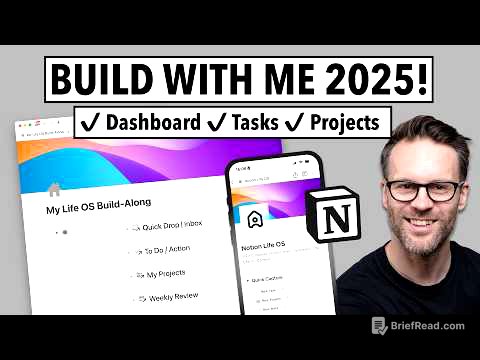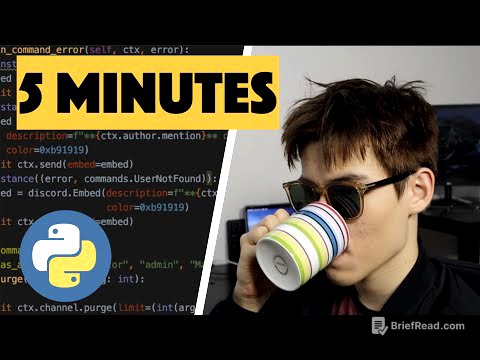TLDR;
This YouTube video features a conversation between Infidel Noodle and Apostate Prophet (AP), focusing on AP's visit to Israel, the Israel-Palestine conflict, and the reactions to AP's commentary within the ex-Muslim community. Key points include:
- AP's motivations for visiting Israel stemmed from a desire to challenge personal biases and understand the conflict deeply.
- The discussion covers the complexities of the conflict, including the proportionality of violence, the role of Hamas, and the suffering of civilians on both sides.
- AP addresses accusations of lacking sympathy for Palestinians and defends his approach to the conflict, often using dark humour.
- The conversation also explores the backlash AP has faced within the ex-Muslim community, particularly regarding his collaboration with David Wood and his views on religion.
Introduction and Initial Queries [0:26]
Infidel Noodle welcomes Apostate Prophet (AP) to the channel, acknowledging him as a controversial figure in the ex-Muslim space. They touch briefly on a recent community post by AP that sparked curiosity, before outlining the main topics for discussion: AP's visit to Israel, his commentary on the conflict, and the responses to his views.
Motivations for Visiting Israel [2:38]
AP explains that the October 7th attack by Hamas prompted his visit to Israel. He was shocked by the atrocities and the subsequent victim-playing narrative that emerged, accusing Israel of genocide. Growing up with negative perceptions of Jewish people, AP felt a sense of justice and sought to understand the situation firsthand. He connected with Joseph from the Israel Advocacy Movement, organised a fundraiser, and travelled to Israel with David to witness the situation and arrange viewings with government contacts.
Experiences and Observations in Israel [5:31]
AP describes the profound impact of his visit, noting that he feels completely changed. He had preconceived notions of Israelis being angry and hateful, but found virtually no hate or anger among the people he met, even from right-wing conservatives. He was confused by the secular population's self-critical views. Visiting sites attacked by Hamas, seeing homes shot into and the location of the Nova festival massacre, deeply affected him.
Challenging Biases and Understanding the Conflict [9:13]
AP clarifies that his primary motive for visiting Israel was to deeply understand the conflict by talking to regular people, both Arab and Jewish. He wanted to see what he was talking about and gain a deeper understanding of the situation. While he acknowledges positive responses to his visit, he notes backlash from some ex-Muslim circles, conspiracy theorists, and those with pre-existing biases against Israel. He encourages those who hate Israel to visit and see for themselves.
Hypocrisy and Sympathy in the Conflict [12:46]
The discussion addresses the hypocrisy of ex-Muslims who readily sympathise with Palestinians but condemn any sympathy towards Israelis. AP attributes this to a Western lens that views Palestinians as the underdog and Israel as the stronger, disliked party. He contrasts the reception of ISIS and Hamas in the Muslim world, noting Hamas's ability to steer the narrative and spread propaganda. He highlights the justification of terrorist attacks against Israelis, such as the Nova Music Festival massacre, and the illogical condemnation of Israel's response.
Proportionality and the Reality of War [17:33]
AP addresses the accusation of genocide, explaining that proportionality in international law doesn't mean equal casualties, but justifiable numbers and efforts to avoid civilian deaths. He argues that Israel is trying its best to warn people and minimise civilian deaths, while Hamas deliberately hides among civilians. He points out that a majority in Gaza approved of the October 7th attacks, implying acceptance of the consequences of war.
Justifying Violence and Civilian Casualties [21:33]
AP asserts that there is no justification for the violence seen on October 7th, including rape and kidnapping. While acknowledging the tragic deaths of civilians, including children, in Gaza, he distinguishes between Hamas's direct targeting of civilians and the IDF's efforts to avoid civilian casualties. He believes the best hope for preventing further deaths is the eradication of Hamas.
Sympathy for Both Sides and Finding Solutions [25:56]
AP defends himself against accusations of lacking sympathy for Palestinian civilians, stating that he also feels bad when he sees reports of suffering on the other side. He challenges critics to offer concrete solutions instead of simply pointing fingers. He believes Israel is moving towards a solution and criticises calls for a ceasefire as merely prolonging the conflict.
Alternative Military Strategies and Destruction in Gaza [30:14]
AP suggests that it might be possible to avoid the scale of destruction in Gaza, but doesn't believe it's easily avoidable. He references a New York Times report indicating that the non-combatant to combatant fatality ratio has been decreasing. He argues that the current ratio is normal compared to other wars, considering the densely populated area and Hamas's use of civilians as human shields. While acknowledging the destruction of residential areas, he believes the intention is not to kill people.
Harmful Rhetoric and Insensitivity [34:41]
AP acknowledges that his approach may seem harsh and insensitive, particularly given the justification and denial of Hamas's actions. He sees himself as part of an information war and prioritises countering narratives that demonise Israel. He defends his use of dark humour as a coping mechanism, noting that it may be misunderstood by those unfamiliar with Western communication styles.
Regrets and the Cycle of Violence [38:32]
AP admits to deleting some tweets due to their potential impact, but doesn't regret his overall commentary. He acknowledges the possibility that the IDF's actions could perpetuate a cycle of violence, but argues that Hamas and other terrorist organisations existed before the current conflict. He hopes that Israel will take over and properly educate people to prevent future conflicts.
Accusations of Bias and Anti-Palestinian Sentiment [45:17]
AP denies accusations of being anti-Palestine due to anti-Islam sentiments. He uses his stance on the treatment of the Uyghur population in China as an example of his consistent opposition to oppression, regardless of the victims' religion or ethnicity. He maintains that Israel is largely in the right in the current conflict, but acknowledges past mistakes.
Palestinian Support for Hamas and the Human Aspect [48:48]
AP acknowledges that Palestinian support for Hamas may stem from a response to perceived oppression. He references a book by a former Hamas member who described the mental torture he endured during Israeli interrogation, leading to a deep sense of hate. However, he questions what Israel is supposed to do in response to this, given the cycle of violence and hatred.
Actions by Israeli Military and Government [51:44]
AP acknowledges concerns about actions taken by the Israeli military and government, such as detaining minors. While admitting that Israeli security forces may be overzealous at times, he questions what those children were supposed to be doing, given the encouragement of violence against Jews in Palestinian media.
Potential War Crimes and the International Criminal Court [53:47]
AP concedes that it is possible the Israeli government or military has committed war crimes. He states that if the International Criminal Court (ICC) concludes that Israel has committed war crimes, those responsible should be held accountable. He also notes that the October 7th attack was a combination of numerous war crimes that tested people's patience and compassion.
Hypocrisy and the Justification of Terrorism [58:58]
AP expresses frustration over the hypocrisy of those who condemn Israel's actions but justify or ignore Hamas's war crimes. He recounts the brutal details of the October 7th attacks, including the murder and mutilation of civilians, and questions why anyone would defend such actions. He argues that justifying the taking of hostages or the execution of prisoners invalidates any criticism of Israel's conduct.
Western Romanticization of the Conflict and Social Media Influence [1:04:37]
AP attributes the Western romanticization of the conflict to the stupidity of younger people who easily fall for propaganda on TikTok and Twitter. He cites the example of young people defending Osama bin Laden after reading his "Letter to America." He argues that the October 7th attacks were even worse than 9/11 due to the direct, face-to-face brutality inflicted on civilians.
The Pleasant Nature of Israelis and Colonization [1:09:25]
AP clarifies that the pleasant nature of Israelis does not excuse any indefensible actions by their government or military. He notes that despite accusations of racism, Israel is a diverse society where Hebrew, Arabic, and English are all widely used. He acknowledges the contentious issue of settler expansions, but argues that some past expansions were justified as defensive measures.
Aid Efforts and Palestinian Suffering [1:14:27]
AP states that there is no evidence that the Israeli government or military is deliberately ruining aid efforts. He suggests following the Twitter account @imshin for reports on life in Gaza. He argues that the degree of Palestinian suffering depicted in the media is often exaggerated, citing instances where reports of starvation were based on distorted information.
The Reality of War and Hamas's Responsibility [1:19:43]
AP acknowledges that people are suffering and lacking access to basic needs due to the war, but reiterates that there is no evidence of Israel deliberately preventing aid from reaching civilians. He argues that Hamas could end the war today by releasing the hostages and surrendering.
Resolving the Conflict and the Two-State Solution [1:31:03]
AP expresses pessimism about resolving the conflict, noting the conflicting narratives and the difficulty of ensuring everyone learns the history properly. He acknowledges the challenge of coexisting peacefully with a population that believes in eradicating Jewish people. He notes that Israeli support for a two-state solution has declined due to the length of the conflict.
Hamas's Charter and Anti-Semitism [1:34:47]
AP dismisses Hamas's amended charter as a pathetic attempt to fool the world, noting that they continue to express anti-Semitic views. He argues that anti-Semitism and the desire to eradicate Jewish people predate the existence of Israel.
The Ex-Muslim Backlash and Community [1:38:34]
AP discusses the backlash he has faced within the ex-Muslim community, criticising the groupthink, tribalism, and policing of opinions. He rejects the notion that he represents all ex-Muslims and defends his right to express his own views, even if they differ from the average ex-Muslim opinion. He criticises ex-Muslims who support Hamas and questions why anyone would expect them to remain a community when they disagree on something so fundamental.
Collaboration with David Wood [1:46:01]
AP defends his collaboration with David Wood, arguing that it is based on their shared goal of fighting Islamist propaganda, not on their religious beliefs. He dismisses concerns about Wood's Christianity, noting that Wood is often accused of being a secular liberal and doesn't advocate for imposing his religious views on others.
Critiques of Christianity and Hypocrisy [1:49:20]
AP dismisses accusations of hypocrisy for not critiquing the harms that can come from Christianity, arguing that he collaborates with Wood because of the way he is, not because of his religious beliefs. He states that if Wood advocated for unacceptable things, he would distance himself.
Pick-Me Mentality and Misrepresentation [1:56:41]
AP accuses one particular critic of having a "pick-me" mentality, suggesting that the critic is motivated by jealousy and a desire to appear superior. He criticises the critic for misrepresenting his views and assuming his motives.
Final Thoughts and Conclusion [2:05:52]
AP and Infidel Noodle conclude the discussion, thanking each other and the audience for their participation. They acknowledge their disagreements but emphasise their ability to have a civil discussion. AP expresses his desire to collaborate with Infidel Noodle again in the future.









